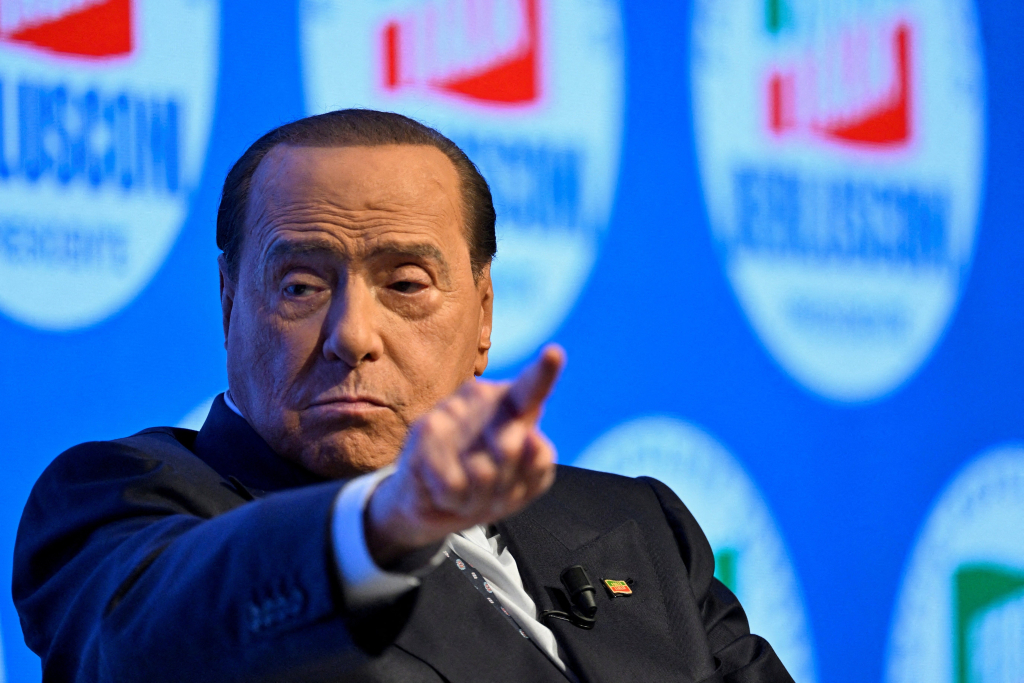Berlusconi Dead
12 June 2023

Far-right Deputy Prime Minister Matteo Salvini declared himself ‘broken’ at the news today that Silvio Berlusconi “a great man and a great Italian” is dead. The former Italian PM and convicted fraudster, died aged 86 at the San Raffaele hospital in Milan.
While his allies on the right are waxing lyrical about the ‘huge void’, and the end of an era, he was reviled by critics for his disregard for the rule of law. One thing is certain, there won’t be many Roma in Europe mourning his demise.
Berlusconi’s global infamy owed much to his legal troubles involving so-called “bunga bunga” parties with young women and underage girls, charges of bribery and investigations into his business dealings. His 2013 conviction in a tax fraud case led to him being stripped of his Senate seat and being banned from running or holding public office for six years. But, for many, what is most toxic about Berlusconi’s legacy is his facilitation of far-right extremism and his role in exacerbating and mainstreaming racism against Roma and migrants.
As Ruth Ben-Ghiat pointed out, back in 1994, it was Berlusconi who broke the taboos against neo-fascist participation in government, “creating a new reality that made Georgia Meloni's career as a mainstream politician possible.” And in 2008, Berlusconi appointed Meloni minister of youth in 2008. This was, according to Ben-Ghiat, another step toward normalisation which paved the way for today's unprecedented situation: a prime minister of a major European country who admires Mussolini and has direct links to neo-fascism.
In the wake of Meloni’s election victory, David Broder, noted the key role played by Berlusconi in the ‘long normalisation of far-right parties’. Berlusconi himself boasted that he “invented the centre-right in 1994” by allying with “the League and the fascists” – “we legitimised and constitutionalised them”. Broder also noted how, from the outset, Berlusconi made harsh anti-immigrant statements, routinely trivialised Mussolini’s crimes and appointed lifelong neo-fascists to top jobs.
In 2008, it was Berlusconi’s declaration of a State of Emergency to combat the so-called ‘Roma menace’ in Italy, that prompted global media coverage, and criticism from human rights groups. The declaration of a state of emergency effectively defined the presence of Roma as one of “serious social alarm” endangering public order and security. When Berlusconi’s interior minister Roberto Maroni announced plans to fingerprint Romani children in June 2008, the move was widely condemned across the political spectrum in Italy as racist, unacceptable and discriminatory.
Recalling Italy’s fascist past, and the 1938 legal census of all foreign-born Jews which prepared the ground for the racial laws, Amos Luzzato, a former head of the Union of Jewish Communities warned the fingerprinting measure set a dangerous precedent:
“You start like this then you move on to the exclusion from schools, separated classes and widespread discrimination,” Amos Luzzatto told La Repubblica. Recalling Italy’s fascist past, he added: “I remember as a child being stamped and tagged as a Jew ... Italy is a country that has lost its memory.”
Berlusconi’s ‘Emergenca Nomadi’ with its demonization of Romani people, heralded a prolonged period of harassment, expulsions, mob violence and pogroms against vulnerable and rights-deprived Romani communities. Lasting from 2008-2011, it served only to exacerbate communal tensions, legitimize human rights abuses, and inflict irreparable damage to any prospects for social inclusion for Roma in Italy.
Together with its Italian partners, the ERRC challenged the State of Emergency decree before the Italian courts, and on 4 November 2011 the Council of State ruled that the emergency decree was unfounded, unmotivated and unlawful. In May 2013, Italy’s Cassation Court rejected the government’s appeal and upheld this ruling.
Up to this day, the legacy of this illegal state of exception still affects Roma as successive governments failed to honour their commitment to ‘get beyond the system of camps.’ While Matteo Salvini has since eclipsed Berlusconi in the virulence of his anti-Roma hate speech, he is indebted to Berlusconi for normalising anti-Roma racism in public life.
While his allies mourn his passing, and the Russians describe him as “a great statesman and visionary”, some of his former adversaries were moved to describe him as a history-maker whose impact on Italian life was unprecedented. It is true that Italy will not see his like again, and this is a matter of some small comfort in these times.




